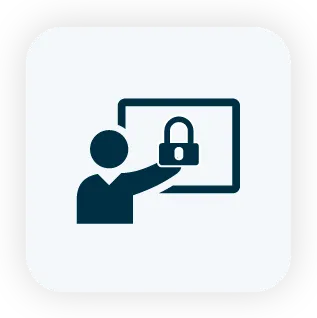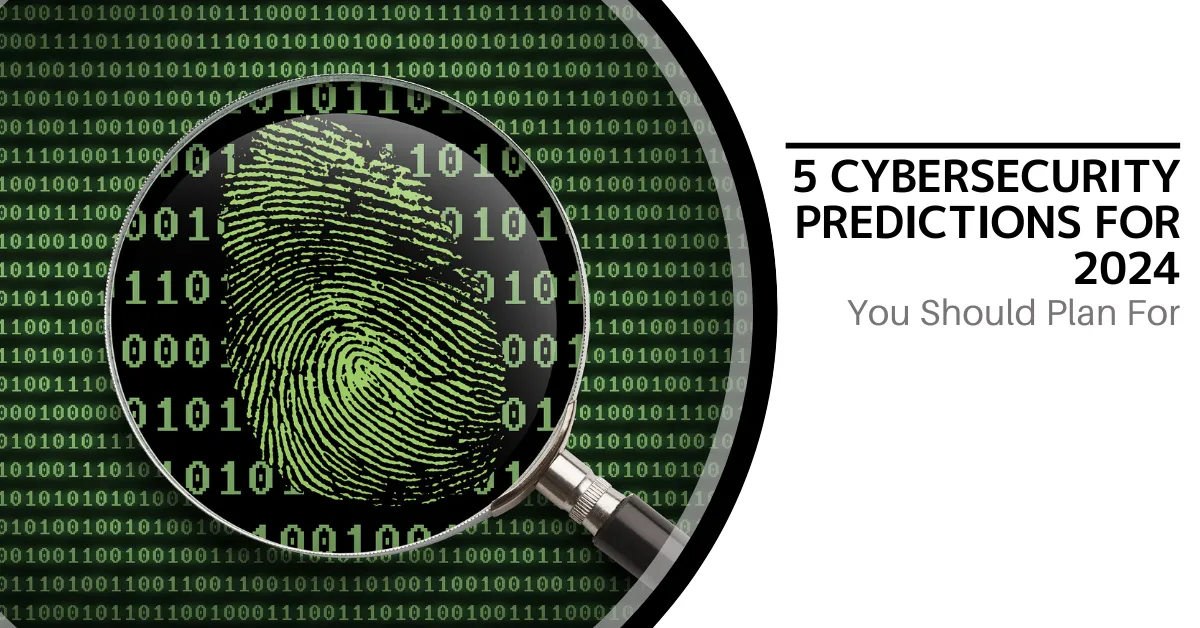PROTECTION AT EVERY LEVEL
Multi-layered Cybersecurity Services To Protect Your Business

Customized Security Plans
Protect your business with our comprehensive cybersecurity services. We offer a full suite of solutions, including threat detection, prevention, and response, ensuring your IT environment remains secure.

Threat Detection and Prevention
Utilize advanced threat detection technologies to identify and mitigate risks before they escalate. Our proactive approach ensures your business stays ahead of potential cyber threats.

Incident Response and Recovery
In the event of a breach, our rapid response team acts swiftly to contain the threat and minimize damage. We help you recover quickly and strengthen your defenses against future attacks.

Security Awareness Training
Empower your employees with the knowledge to recognize and respond to cyber threats. Our comprehensive training programs get your first line of defense ready—your people.

Compliance and Risk Management
Navigate the complex landscape of data protection regulations with our expert guidance. We ensure your business complies with industry standards and manages risk effectively.
Focus on Your Business,
We've Got Your Cybersecurity Covered
Cyber threats evolve. They evolve every day. It's like playing four dimensional chess and you are never sure where the threat is coming from. Having a comprehensive cybersecurity strategy is crucial. At CMIT Solutions, we believe the most important components include data compliance, tailored software products, cyber threat awareness, risk mitigation plans, and continuous monitoring of cyber activities. These elements work together to prevent data loss, reduce risks, and ensure compliance with regulations.
Not to worry. We've got you covered.
Customized Security Plans
Every organization is unique, and so are its cybersecurity needs. That's why we tailor our strategies to align with your specific business goals and regulatory requirements. Whether your business benefits from the practical guidelines of the CIS (Center for Internet Security) framework or must adhere to the strict standards set by NIST (National Institute of Standards and Technology), we adapt our services to meet you where you are.
Our approach ensures that your cybersecurity measures are both effective and compliant, addressing what is practical and what is required to protect your operations.
Multi-Layered Security Solutions
Implement a robust, multi-layered defense system designed to protect every aspect of your IT infrastructure. From endpoint security to network monitoring, email and cloud services; our solutions cover all the bases.
Cyber Hygiene
According to Barracuda Networks and UC Berkeley, 91% of all cyberattacks start with an email. Phishing, spearphishing, whaling, and Business Email Compromise (BEC) are just a few of the threats that can infiltrate your inbox. Email security is about more than preventing spam—it's about protecting your business from the devastating consequences of clicking on the wrong link. Our cyber training programs will equip your team with the awareness and skills needed to recognize and avoid these threats, and what to do about them.
vCISO
CMIT Solutions of Dallas vCISO practice brings decades of cybersecurity leadership and experience that aligns information security programs with business objectives to measurably improve public and private organizations' security posture.
Free Cybersecurity Assessment
*It takes less than an hour!
Complete the form below and a member of our team will contact you to schedule your free 16-point cybersecurity assessment.
I agree to terms & conditions provided by the company. By providing my phone number, I agree to receive email messages from CMIT Solutions of Dallas.

5 Cybersecurity Predictions for 2024 You Should Plan For
Cybersecurity is a constantly evolving field. New threats, technologies, and opportunities emerge every year. As we enter 2024, organizations need to be aware of current and future cyber threats. Businesses of all sizes and sectors should plan accordingly.
Staying ahead of the curve is paramount to safeguarding digital assets. Significant changes are coming to the cybersecurity landscape. Driving these changes are emerging technologies, evolving threats, and shifting global dynamics. Here are key cybersecurity predictions for 2024 that you should consider.
1. AI Will Be a Double-edged Sword
Artificial intelligence (AI) has transformed cybersecurity. It enables faster and more accurate threat detection, response, and prevention. But AI also introduces new risks such as adversarial AI, exploited vulnerabilities, and misinformation. Malicious actors use chatbots and large language models to generate convincing phishing emails, fake news articles, and deepfake videos. This malicious content can deceive or manipulate users. Organizations must implement robust security protocols, maintain a human-in-the-loop approach, and regularly review their AI systems to mitigate these risks and harness AI's power for a more secure future (Forbes).
AI-driven attacks are becoming more sophisticated. Hackers can use AI to automate tasks, making their operations more efficient and harder to detect. AI can be used to identify vulnerabilities in systems, craft personalized phishing messages, and even launch autonomous attacks. This means organizations need to stay ahead by using AI to counter these threats. Implementing AI-based security measures such as anomaly detection, behavior analysis, and automated response systems can help detect and thwart attacks before they cause significant damage (CSO Online).
2. Quantum Computing Will Become a Looming Threat
Quantum computing poses a serious threat to current encryption standards. Quantum computers can potentially break asymmetric encryption algorithms widely used to protect data in transit and at rest. Quantum-enabled hackers could compromise sensitive data like financial transactions. Organizations must start preparing by assessing their potential risks, adopting quantum-resistant technologies, and deploying quantum-safe architectures (TechRepublic).
Quantum computing is not just a theoretical risk; its development is progressing rapidly. Companies and governments are investing heavily in quantum research, bringing us closer to a reality where quantum computers can break widely used encryption methods. Businesses must begin transitioning to quantum-resistant encryption methods, such as lattice-based cryptography, to protect sensitive data from future quantum attacks (ZDNet).
3. Hacktivism Will Rise in Prominence
Hacktivism uses hacking techniques to promote political or social causes, such as exposing corruption or protesting injustice. Hacktivism is expected to increase in 2024, particularly during major global events like the Paris Olympics and the U.S. Presidential Election. Hacktivists may target organizations they perceive as adversaries, including governments, corporations, or media outlets. These attacks can disrupt operations, leak data, or deface websites. Organizations must be vigilant against potential hacktivist attacks by proactively defending their networks, systems, and reputation (Wired).
The rise of hacktivism is driven by increased political and social polarization worldwide. Hacktivists are becoming more organized and sophisticated, often collaborating across borders. They use various tactics, including DDoS attacks, website defacement, and data leaks, to achieve their objectives. Organizations must enhance their security postures by conducting regular vulnerability assessments, monitoring for signs of intrusion, and engaging in threat intelligence sharing with peers and law enforcement agencies (Dark Reading).
4. Ransomware Will Remain a Persistent Threat
Ransomware is a type of malware that encrypts the victim's data, with the attacker demanding a ransom for its decryption. Ransomware has been one of the most damaging types of cyberattacks in recent years. In 2023, ransomware attacks increased by more than 95% over the prior year (ZDNet). Ransomware attacks are likely to continue increasing in 2024 due to new variants, tactics, and targets. Ransomware attackers may leverage AI to enhance their encryption algorithms, evade detection, and customize their ransom demands. Hackers may also target cloud services, IoT devices, or industrial control systems, causing more disruption and damage. Organizations need comprehensive ransomware prevention and response strategies, including regularly backing up data, promptly patching systems, using reliable email and DNS filtering solutions, and educating users on how to avoid phishing emails (CSO Online).
Ransomware groups are also evolving their tactics to increase pressure on victims, such as double extortion, where they threaten to release stolen data if the ransom is not paid. They are also targeting supply chains, where a single attack can impact multiple organizations. Businesses must implement layered security approaches, including endpoint detection and response (EDR), network segmentation, and incident response planning, to effectively counter ransomware threats (Security Boulevard).
5. Cyber Insurance Will Become More Influential
Cyber insurance covers the losses and liabilities resulting from cyberattacks. It has become more popular and important as cyberattacks become more frequent and costly. Cyber insurance helps organizations recover from cyber incidents faster by providing financial compensation, legal help, or technical support. But cyber insurance also influences security practices. More cyber insurers may impose requirements on their customers, such as implementing specific security controls or frameworks. Organizations must balance the benefits and costs of cyber insurance and ensure compliance with their cyber insurers' expectations (Business Insurance).
As cyber insurance becomes more influential, it also drives higher standards for cybersecurity practices. Insurers increasingly require detailed risk assessments, evidence of security measures, and incident response plans before providing coverage. This trend encourages businesses to adopt best practices and invest in robust cybersecurity measures to qualify for and maintain insurance coverage. Additionally, cyber insurance can provide valuable resources, such as access to incident response teams and threat intelligence, which can enhance an organization’s overall security posture (Insurance Journal).
Be Proactive About Cybersecurity – Schedule an Assessment
The cybersecurity landscape will continue to evolve rapidly. Organizations must proactively prepare for emerging threats by adopting advanced technologies, prioritizing workforce development, and staying abreast of regulatory changes. Put a comprehensive cybersecurity strategy in place that encompasses these predictions to help you navigate the digital frontier with resilience and vigilance.
Need help ensuring a secure and trustworthy digital environment for years to come? Contact us today to schedule a cybersecurity assessment.
CMIT Security Solutions
There is no cybersecurity silver bullet.
Cyberattacks can take many forms, from infected emails to compromised admin accounts.
Defending against these threats requires a layered approach, where if one defense fails, another can identify and stop the attack.
This includes keeping people routinely trained and informed about the latest threats
Our security checklist identifies 15 recommended strategies, tailored to align with CIS and NIST frameworks.
This comprehensive approach ensures robust protection suited to your business's security posture, covering all bases to keep your business safe.
"CMIT has given me peace of mind in my business by providing me with ongoing protection, monitoring and an invaluable resource of providing technical help 24/7 if needed. They have assisted me with various technical needs in my business and I appreciate small businesses supporting other small businesses in our community."
Swiss Learning Center
"CMIT sent Leslie out to deal with my computer issue - which she handled so fast I can't remember now what it was! Leslie was patient, informative, and engaged me with confidence and relief. She did not talk down to me as if I didn't have a modicum of sense - electronically - but instead was in a teaching mode. I'm so glad to know I can call CMIT whenever I have a problem and allay my fear!"
Shari
"Every business NEEDS Carmen and Jaime with CMIT Solutions. They have taken my business to the next level and I am so grateful to have them on our team. It's like having our own personal IT department. We are more productive, more professional, and ready to worry about things other than IT. As a construction company - it is not in our wheelhouse to manage this side of the business and as a small business it's not super easy to know who to contact. They are affordable and knowledgeable and can easily take any business to where they envision. They come with my highest recommendation."
Ashley R.
Get In Touch
Email: [email protected]
Address
Office: 4514 Cole Ave # 600, Dallas, TX 75205
Assistance Hours
Mon – Fri 8:00am – 5:00pm
Sat-Sun – CLOSED
Phone Number:
NOT JUST IT. COMPLETELY MANAGED IT.
Complete IT solutions the moment you need them.
© 2024 CMIT Solutions of Dallas - All Rights Reserved,


